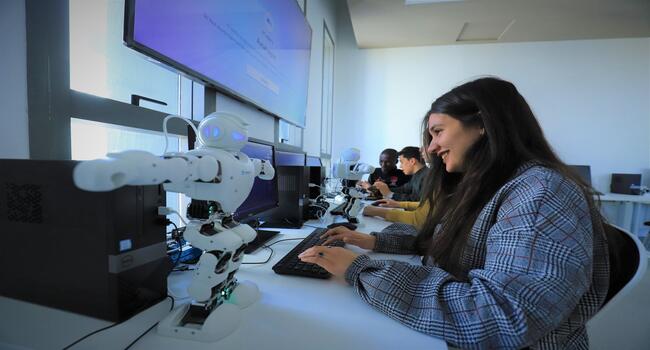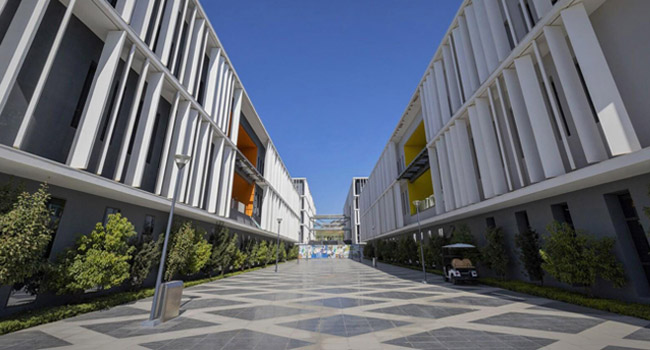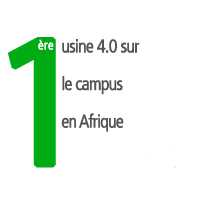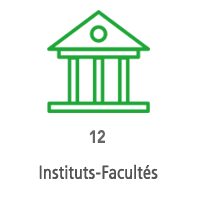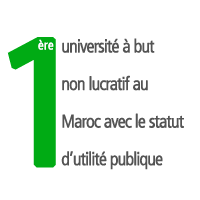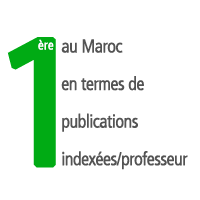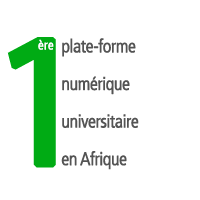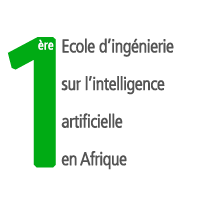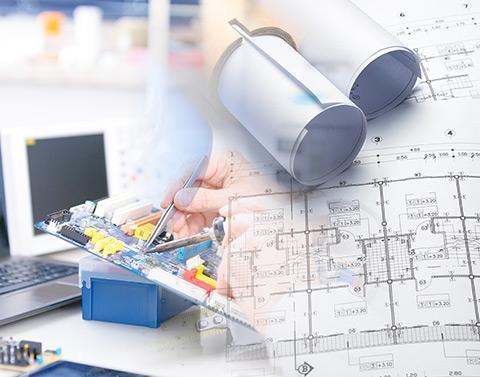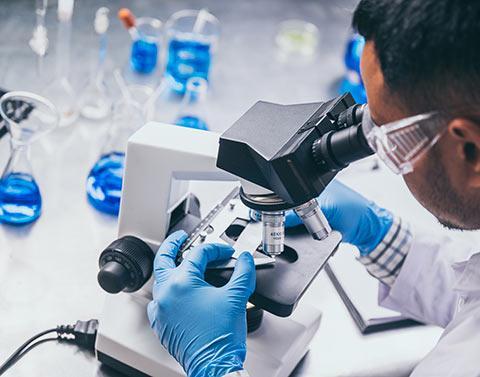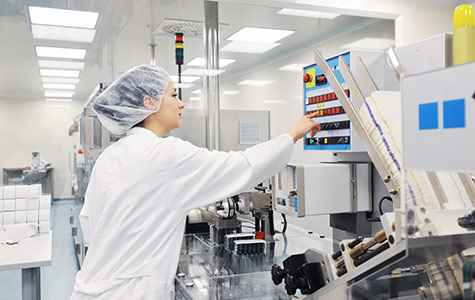Génie Electrique EEA (Electronique, Electrotechnique, Automatique)
Ingénieur d’Etat
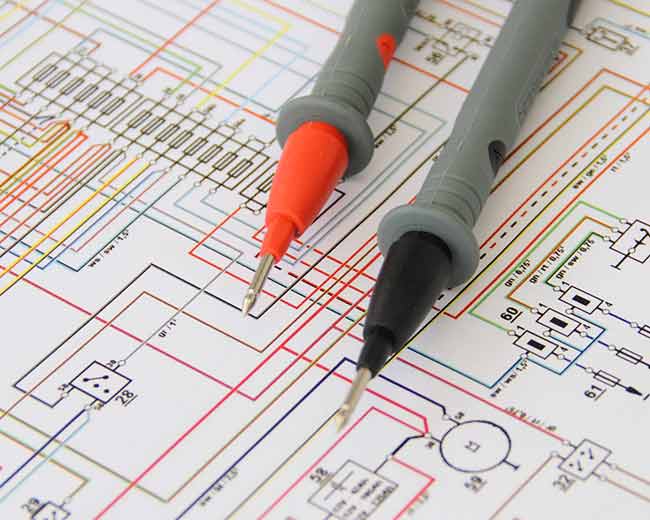
Diplôme délivré
: IngénieurDurée des études
: 3 ansCoordonnateur
: Pr. Anass BAKKOURI, Pr. Chakib ALAOUI, Pr. Moad ESSABBARModules du tronc commun en génie électrique
Code ==> Intitulé du module
GE11 ==> Electronique numérique
GE12 ==> Electrotechnique
GE13 ==> Introduction au management d'équipe
GE14 ==> Circuits logiques et informatique matérielle
GE15 ==> Synthèse et commandes numériques
GE16 ==> Analyse des signaux et systèmes discrets
GE17 ==> Design I
GE18 ==> Langues et communication I
GE21 ==> Transmission des ondes électromanétiques
GE22 ==> Physique des composantes électroniques
GE23 ==> Production de l'énergie électrique & Réseaux
GE24 ==> Communications optiques
GE25 ==> Total Quality Management
GE26 ==> Design II
GE27 ==> Systèmes de communication I
GE28 ==> Langues et communication II
GE31 ==> Opto-électronique
GE32 ==> Ingénierie de la compatibilité électromagnétique
GE33 ==> Laser et applications
GE34 ==> Systèmes de communication II
GE35 ==> Machines électriques
GE36 ==> Design III
GE37 ==> Matériaux de l'ingénieur
GE38 ==> Langues et communication III
GE41 ==> Industrialelectronics I
GE42 ==> Analyse économique en ingénierie
GE43 ==> Semi-conductordevices I
GE44 ==> Design IV
GE45 ==> Traitement numérique du signal
GE46 ==> Distributed intelligent systems
GE47 ==> Energy conversion, storage system, and renewable energy
GE48 ==> Langues et communication IV
Option AUTOMATIQUE
Code ==> Intitulé du module
GE51-A ==> Commande industrielle
GE52-A ==> Commande des systèmes avancés
GE53-A ==> Identification des systèmes
GE54-A ==> Capteurs et systèmes d’imagerie
GE55-A ==> Robotique industrielle et appliquée
GE56-A ==> Commandes des processus industriels
GE57-A ==> Automatisme industriel
GE58-A ==> Ethique et professionnalisme
PFE ==> Projet de fin d’études
Option ELECTRONIQUE
Code ==> Intitulé du module
GE51-B ==> Design technologies for integrated systems
GE52-B ==> Industrialelectronics II
GE53-B ==> Fundamentals of VLSI (Very Large Scale Integration) design
GE54-B ==> Semi-conductordevices II
GE55-B ==> Statistical inference and machine learning
GE56-B ==> Systèmes embarqués temps réel
GE57-B ==> Micro-électronique analogique, numérique et mixte
GE58-B ==> Ethique et professionnalisme
PFE ==> Projet de fin d’études
Option ELECTROTECHNIQUE
Code ==> Intitulé du module
GE51-C ==> Commande industrielle
GE52-C ==> Electronique de puissance
GE53-C ==> Exploitation de l'energie électrique
GE54-C ==> Entrainements à vitesse variable
GE55-C ==> Energie renouvelable : production décentralisée et réseaux électriques intelligents
GE56-C ==> Power system dynamics
GE57-C ==> Power system restructuring and deregulation
GE58-C ==> Ethique et professionnalisme
PFE ==> Projet de fin d’études
Les diplômées et diplômés de l’Euromed Polytechnic School sont préparés à un grand choix de professions dans les domaines de l’électronique (micro, nano, RF, VLSI), des technologies de l’information principalement orientées vers la couche physique (radio-fréquences, photonique, traitement du signal et d’images, communication multimédia), de l’énergie électrique (énergies renouvelables,smart grids,microgrids, stockage d’énergie,power quality, électronique industrielle, électronique de puissance, conversion d’énergie, machines électriques) et de l’automatique.
Ce cursus d’ingénieur en génie électrique offre une excellente préparation tant pour la recherche au niveau doctoral que pour le monde professionnel dans les industries de pointe et la technologie.
Descriptif de la filière :
Les sciences de l’électricité sont au cœur des grands enjeux auxquels notre société doit faire face. Maîtriser le développement des technologies de l’information, de la communication et des données, assurer un approvisionnement énergétique fiable, responsable et durable, innover en matière d’électronique, voici quelques-uns des défis que les ingénieurs en génie électrique options électronique, électrotechnique et automatique sont appelés à relever. L’électricité est au cœur des évolutions de notre société. C’est elle qui a donné naissance à l’électronique, une percée technologique majeure. Montres connectées, drones, écrans souples, casques de réalité virtuelle, assistants domotiques, ces dispositifs ne fonctionneraient pas sans l’électronique, ni la miniaturisation qui la caractérise. Miniaturiser n’est néanmoins pas le seul objectif des ingénieurs en électronique qui doivent aussi concevoir des dispositifs plus complexes et moins coûteux, tout en étant plus puissants et moins gourmands en courant.
Certains capteurs sont aujourd’hui si minuscules qu’ils peuvent se fixer sous la peau. Une fois en place, ils enregistrent des paramètres physiologiques comme le rythme cardiaque, la pression artérielle ou le taux de glucose dans le sang. Ils transmettent également leurs données par connexion sans fil et sont même capables d’administrer aux patientes et patients une dose de médicament. L’ordinateur quantique, qui utilise des circuits mêlant électronique et optique, est un autre exemple de révolution à venir dans cette discipline.
Il est impossible d’évoquer l’électricité sans l’associer au concept d’énergie qui est au cœur de tous les enjeux liés à notre approvisionnement énergétique de demain. Les énergies fossiles auront une fin et la sortie du nucléaire est sur l’agenda de plusieurs pays. L’heure est donc à la transition énergétique. Dans ce processus, le rôle des ingénieurs en génie électrique est central. Ces spécialistes sont derrière les nouvelles sources d’énergie comme l’éolien ou le solaire, ainsi que dans la conception des réseaux de production et de transport de l’électricité. Leur contribution sera majeure pour l’avenir de la planète.
Euromed Polytechnic School (EPS)
La formation en génie électrique permet de développer :
- Aptitude à mobiliser les ressources d’un large champ de sciences fondamentales.
- Connaissance et compréhension d'un champ scientifique et technique de spécialité.
- Maîtrise des méthodes et des outils de l’ingénieur : identification et résolution de problèmes, même non familiers et non complètement définis, collecte et interprétation de données, utilisation des outils informatiques, analyse et conception de systèmes complexes, expérimentation.
- Dans les domaines scientifique et technologique : capacité à concevoir, développer et mettre en œuvre des systèmes et des solutions dans les champs de l’ingénieur en électronique, électrotechnique, télécommunications, systèmes électroniques embarqués…
Ces capacités sont complétées en fonction des mineures choisies :
- En ingénierie des systèmes embarqués (dans les domaines des objets connectés et des véhicules autonomes) : capacité à concevoir et développer des systèmes électroniques embarqués où le logiciel et le matériel sont étroitement liés, dans une démarche d’intégration complète.
- En électronique des systèmes de l’automobile et de l’aérospatial : capacité à concevoir et développer des systèmes électroniques de télécommunication tels que la téléphonie sans fil et les objets communicants (automobile, avion, espace…). - En ingénierie des communications : capacité à concevoir des solutions globales de télécommunication, mettant en œuvre les technologies actuelles et futures (connaître l’ensemble des solutions disponibles, proposer des architectures, spécifier et intégrer des sous-ensembles).
- En génie électrique et transport : capacité à maîtriser les problématiques industrielles de gestion de réseaux électriques et de production de l’énergie, de la transformation et du stockage de l’énergie électrique.
- En automatique robotique industrielle : capacité à analyser, modéliser, piloter des systèmes de productions industriels tout en assurant leur sureté de fonctionnement.
- En mécatronique et génie électrique : capacité à intégrer des projets multiphysiques complexes combinant mécanique, électronique et informatique temps réel.
- En énergie et développement durable : capacité à mettre œuvre des solutions énergétiques combinant efficacité énergétique et rentabilité économique.
- Compétences transversales : capacité à gérer les aspects organisationnels, économiques, humains et techniques d’un projet dans le champ d’un ingénieur généraliste.
- Capacité à s'intégrer dans une organisation, à l’animer et à la faire évoluer : engagement et leadership, management de projets, maîtrise d’ouvrage, communication avec sa hiérarchie, avec des spécialistes comme avec des non-spécialistes.
- Prise en compte des enjeux industriels, économiques et professionnels : compétitivité et productivité, innovation, propriété intellectuelle et industrielle, respect des procédures qualité, sécurité.
- Aptitude à travailler en contexte international : maîtrise d’une ou plusieurs langues étrangères, sûreté, intelligence économique, ouverture culturelle, expérience internationale.
- Respect des valeurs sociétales : connaissance des relations sociales, environnement et développement durable, éthique.
L’accès en 1èreannée du cycle d’ingénieur en génie des procédés est ouvert :
Par voie automatique :
Etudiants ayant validé les 2 années préparatoires intégrées de l’Euromed Polytechnic School ; Etudiants des classes préparatoires scientifiques admissibles au Concours National Commun ou équivalent.
Par voie de concours et entretien :
Etudiants ayant validé les deux années préparatoires intégrées à un cycle d’ingénieur différent de celui de l’Euromed Polytechnic School ;
Etudiants ayant validé les deux premières années post-baccalauréat en sciences, sciences et techniques ou en technologie ou les trois premières années post-baccalauréat en sciences, sciences et techniques ou en technologie.
Pour cette catégorie, la sélection se fait sur la base de :
Résultats obtenus au baccalauréat ;
Résultats obtenus dans les années post-baccalauréat ;
Entretien technique et de motivation.
Pourquoi choisir le cycle d’ingénieur en génie électrique ?
La filière en génie électrique de l’Euromed Polytechnic School répond à des besoins en augmentation de secteurs interconnectés des sciences et de la technologie. Il forme des chercheuses et chercheurs et des professionnelles et professionnels de très haut niveau dans les domaines de l’électricité, de l’électronique, de l’électronique et de l’automatique.
Les étudiantes et étudiants assistent, d’une part, aux cours dispensés par un corps professoral de renommée internationale et participent, d’autre part, à de nombreux projets de groupe et travaux pratiques en laboratoire. La formation en génie électrique de l’EPS englobe aussi bien les bases théoriques que les aspects pratiques de cette discipline. Il est par ailleurs possible de choisir l’une des spécialisations suivantes :
- Electronique
- Electrotechnique
- Automatique.
Les diplômés exercent leur activité dans les entreprises issues des secteurs de l’ingénierie, de la recherche, dans les industries manufacturières et de l’énergie, dans les sociétés de service, les télécommunications…
Le profil spécialiste et en même temps généraliste de ces ingénieurs leur permet d’embrasser également des carrières dans le tertiaire, au sein des secteurs de la banque et de l’assurance par exemple.
Le diplômé peut prétendre aux emplois d'ingénieur bureau d’études, ingénieur de recherche et développement, ingénieur méthode, ingénieur de production, ingénieur conseil, ingénieur d’affaires, chef de projet…






